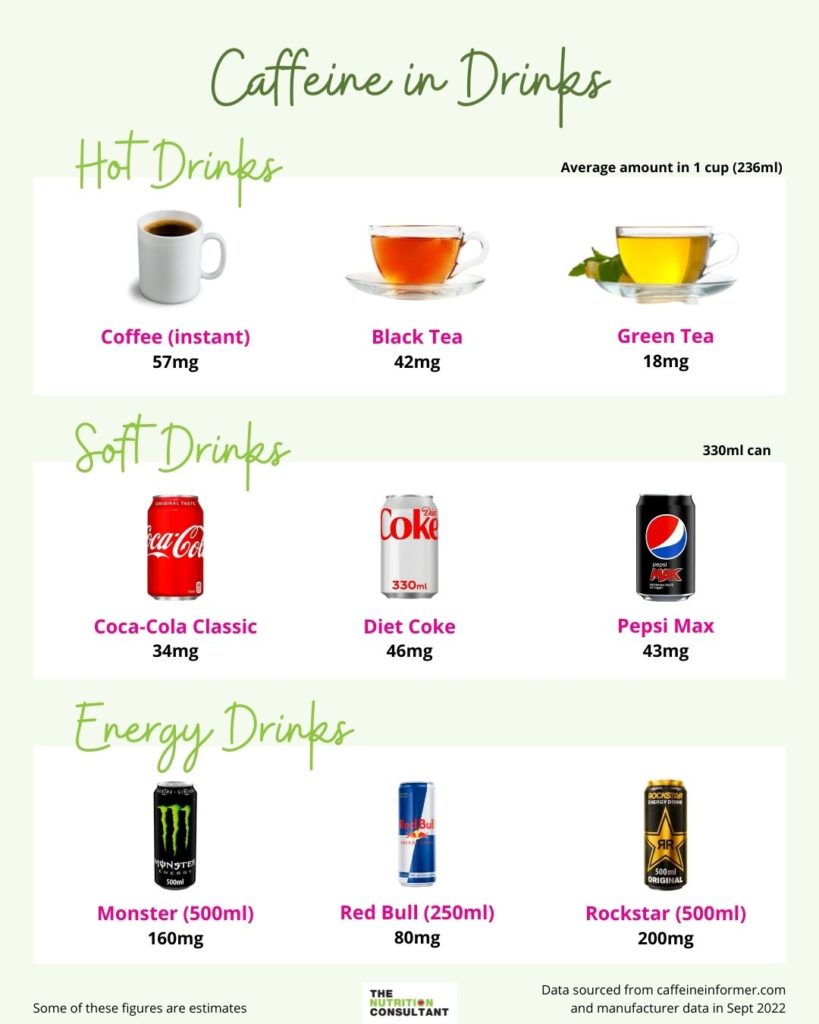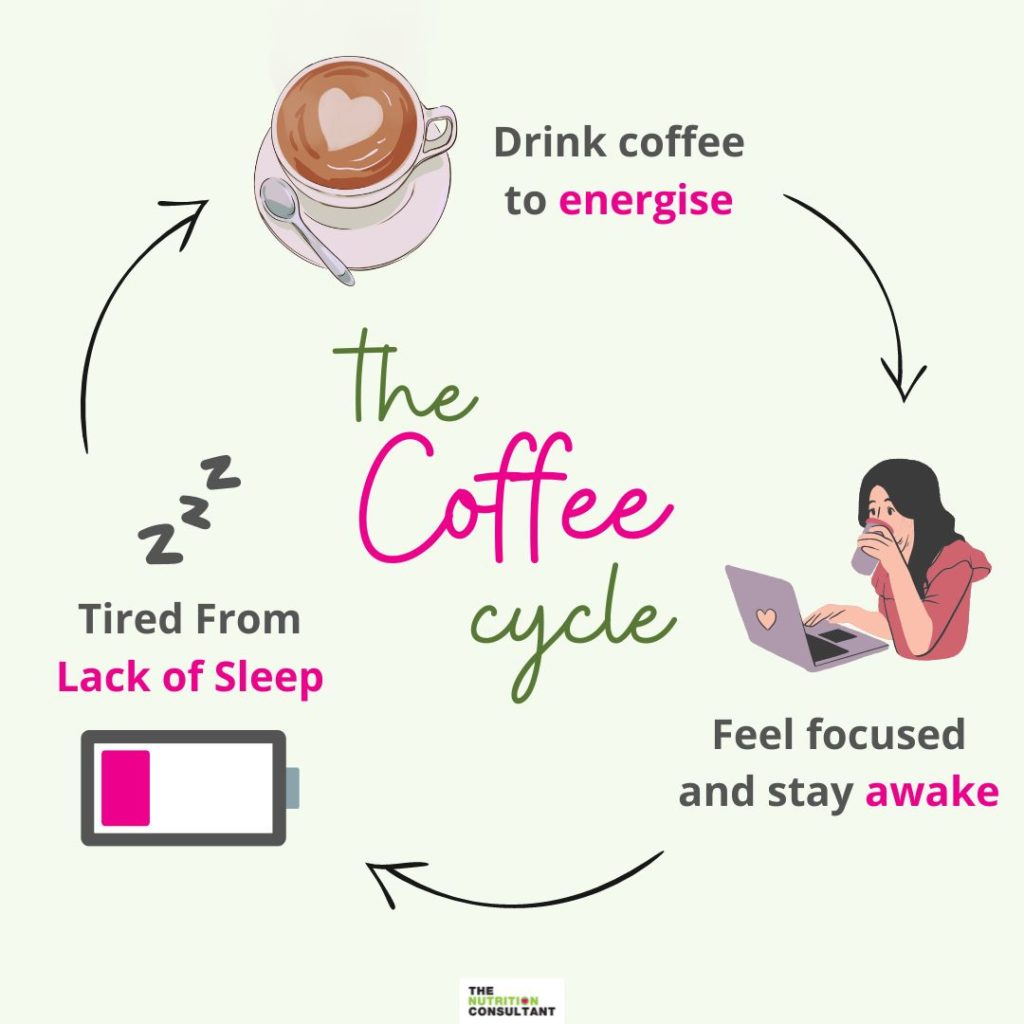Coffee: Beneficial or harmful to health?
Coffee is a morning must-have for many people, but there is a lot of conflicting information about this beloved beverage in the media. Some say it’s harmful and others praise the drink for its many health benefits – so who’s right?
In this blog, I’ll be sharing how you can incorporate coffee into a healthy balanced diet, along with an overview of the scientific evidence behind coffee’s health claims and potential risks.
Nutrition
Polyphenols
Coffee is a rich source of polyphenols – a group of compounds known for their antioxidant properties. In fact, coffee contains more polyphenols than any other beverage. These polyphenols are thought to play a role in some of the possible health benefits of coffee (which will be discussed later).
However, polyphenols found in coffee can also reduce the absorption of non-haem iron (the type found in plant-based foods). One way to increase iron absorption is to avoid drinking coffee (and tea) with your meals. Instead, have your cup of coffee 1 hour either side of breakfast, lunch, and dinner to ensure optimal iron absorption.
Sugar
One thing to bear in mind when considering the healthfulness of your cup of coffee is how you like to drink it. If you like your coffee sweet, and have it regularly, try to go easy on the sugar and the syrups. Even if you only have a couple of teaspoons in each cup, that is still around a quarter of your recommended daily free sugar intake (30g/day for adults). It’s easy to not realise much sugar you are consuming through drinks, and just a few cups of coffee with sugar a day can build up.
Not sure how much sugar is in your favourite coffee shop drink? You might be surprised! Check out my Instagram post about the sugar content of popular coffee shop drinks: https://www.instagram.com/p/CW49aWyqxbS/?hl=en
If you’re a big coffee drinker, my advice is to slowly reduce the amount of sugar in each cup until you’re happy having it without and opt for the lower sugar options when you’re at a coffee shop. But remember, going all out on a tasty-looking drink every now and then won’t hurt!
Benefits of coffee
Longevity and Health
Current research suggests that coffee consumption is associated with a longer lifespan and a reduced risk of diseases such as cardiovascular disease, type 2 diabetes, and some cancers. In addition, there is some evidence to suggest that coffee has a protective effect against neurodegenerative diseases such as Alzheimer’s and Parkinson’s, though these results are inconsistent.
Interestingly, coffee drinkers may also have a reduced risk of depression. One observational study found that women with the highest caffeinated coffee intake had the lowest risk of depression.
However, as most of this research is observational, we cannot be certain that coffee was the cause of this reduction in disease risk. It is possible that other socioeconomic factors or lifestyle habits common among coffee drinkers could be responsible for these findings. So, whilst this evidence is promising, more high-quality studies are needed to establish cause and effect.
Laxative Effects
If you find that your morning brew results in you dashing to the bathroom 20 minutes later, you’re not alone. One study has reported that nearly a third of survey responders felt the urge to go to the bathroom after a cup of coffee. This is linked to coffee’s ability to stimulate bowel activity, so if you’re struggling with irregular bowel movements, having coffee in the morning might help change that.
Cognitive Benefits
Many of us have reached for an afternoon cup of coffee to help get us through the day. Thanks to its caffeine content, coffee can keep us more alert and improve our cognitive performance.
When should I limit coffee?
There are some circumstances when coffee should be limited due to its high caffeine content, such as during pregnancy and breastfeeding. It might also be beneficial to limit caffeine several hours before bed or if it triggers anxiety.
Pregnancy and Breastfeeding
It is recommended that coffee is limited during pregnancy as studies have found that caffeine intake can impact foetal development and growth, increasing the risk of low birth weight.
Breastfeeding women are also advised to limit caffeine intake, as it can be passed through breast milk into the baby, which can keep them awake.
The NHS recommends that pregnant and breastfeeding women should limit their caffeine intake to no more than 200mg per day.
For context, this is how much caffeine is in some popular dietary sources:




Unpleasant Side Effects
Have you experienced post-coffee jitters?
Caffeine is a stimulant, and it can trigger unpleasant side effects including anxiety, heart palpitations and jitteriness. Some people are more sensitive to caffeine than others, so if you experience these side effects whilst drinking caffeinated drinks, try switching to decaf or avoiding them altogether.
Before Bed
Whilst coffee is great for switching your brain on, it’s not so great when you want to switch off. That’s why drinking a cup of coffee before bed (or even mid-afternoon) probably isn’t the best idea.
Studies have shown that caffeine can impact our ability to fall asleep and reduce sleep quality. The problem is, once you start to feel sleep deprived the next day, you’re more likely to reach for another cup of coffee to stay awake, which can leave you feeling restless and awake the following night – so it’s easy to get stuck in a never-ending cycle.
Everyone metabolises coffee at different rates, but it’s generally recommended that you avoid caffeinated drinks at least 6 hours before bed for a good night’s sleep!

How much coffee is safe to drink?
If you’re not pregnant or breastfeeding and you don’t feel negatively affected by coffee, it’s generally recommended that most adults can safely consume 300-400mg of caffeine per day (with an upper limit of 600mg). This is the equivalent of around 5-6 cups of instant coffee (but remember other foods and drinks contain caffeine too!). However, children and teenagers should be consuming much less than this.
Another thing to think about is why you are reaching for a cup of coffee. If you’re fancying another hot drink and coffee is your favourite, that’s fine. However, if you are replacing snacks and meals with a cup of coffee, you might not be getting all the nutrients you need throughout the day. Coffee can be a part of a healthy balanced diet, but it shouldn’t replace food!
Summary
There is some research to suggest that coffee has benefits beyond being a morning pick-me-up, such as potentially reducing the risk of some diseases. However, more high-quality research is required before we can confidently determine this link.
Whilst coffee can help boost your cognitive performance and help keep you regular, not everyone can tolerate the drink well due to its high caffeine content. If you experience post-coffee anxiety, it’s best to switch to decaf or avoid it altogether.
Pregnant and breastfeeding women are advised to limit caffeine to 200mg per day.
Try to avoid drinking coffee (and other caffeinated drinks) at least 6 hours before bed to help get a good night’s sleep.
Overall, coffee is perfectly safe to drink (within normal consumption levels) and may even have health benefits.
References
Pérez-Jiménez, J., Neveu, V., Vos, F. and Scalbert, A., 2010. Identification of the 100 richest dietary sources of polyphenols: an application of the Phenol-Explorer database. European journal of clinical nutrition, 64(3), pp.S112-S120.
Poole, R., Kennedy, O.J., Roderick, P., Fallowfield, J.A., Hayes, P.C. and Parkes, J., 2017. Coffee consumption and health: umbrella review of meta-analyses of multiple health outcomes. bmj, 359.
Zhou, X. and Zhang, L., 2021. The neuroprotective effects of moderate and regular caffeine consumption in Alzheimer’s disease. Oxidative Medicine and Cellular Longevity, 2021.
Hernán, M.A., Takkouche, B., Caamaño‐Isorna, F. and Gestal‐Otero, J.J., 2002. A meta‐analysis of coffee drinking, cigarette smoking, and the risk of Parkinson’s disease. Annals of neurology, 52(3), pp.276-284.
Lucas, M., Mirzaei, F., Pan, A., Okereke, O.I., Willett, W.C., O’Reilly, É.J., Koenen, K. and Ascherio, A., 2011. Coffee, caffeine, and risk of depression among women. Archives of internal medicine, 171(17), pp.1571-1578.
Brown, S.R., Cann, P.A. and Read, N.W., 1990. Effect of coffee on distal colon function. Gut, 31(4), pp.450-453.
Rao, S.S., Welcher, K., Zimmerman, B. and Stumbo, P., 1998. Is coffee a colonic stimulant?. European journal of gastroenterology & hepatology, 10(2), pp.113-118.
Brice, C.F. and Smith, A.P., 2002. Effects of caffeine on mood and performance: a study of realistic consumption. Psychopharmacology, 164(2), pp.188-192.
Sengpiel, V., Elind, E., Bacelis, J., Nilsson, S., Grove, J., Myhre, R., Haugen, M., Meltzer, H.M., Alexander, J., Jacobsson, B. and Brantsæter, A.L., 2013. Maternal caffeine intake during pregnancy is associated with birth weight but not with gestational length: results from a large prospective observational cohort study. BMC medicine, 11(1), pp.1-18.
Winston, A.P., Hardwick, E. and Jaberi, N., 2005. Neuropsychiatric effects of caffeine. Advances in Psychiatric Treatment, 11(6), pp.432-439.
Clark, I. and Landolt, H.P., 2017. Coffee, caffeine, and sleep: A systematic review of epidemiological studies and randomized controlled trials. Sleep medicine reviews, 31, pp.70-78.
Drake, C., Roehrs, T., Shambroom, J. and Roth, T., 2013. Caffeine effects on sleep taken 0, 3, or 6 hours before going to bed. Journal of Clinical Sleep Medicine, 9(11), pp.1195-1200.









